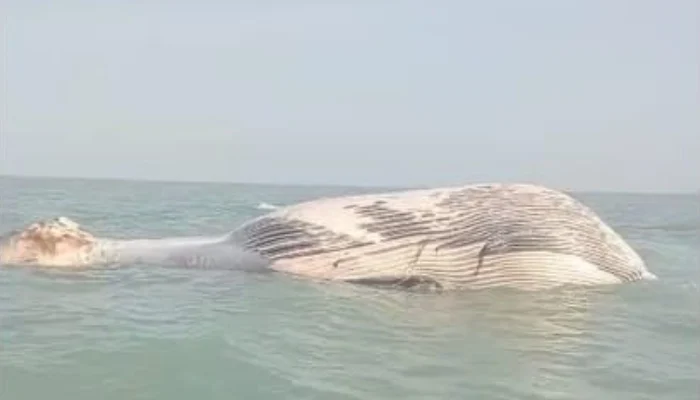
Dead Blue Whale Found off Pakistan-Iran Coast Near Balochistan
A rare and tragic discovery has been made along the Pakistan-Iran maritime border near the coast of Balochistan, where a dead blue whale was found floating in the open waters. The incident has sparked concern among marine biologists, environmentalists, and local communities, drawing attention to the condition of marine life in the region. The blue whale, known as the largest animal on Earth, is an endangered species, and such occurrences raise critical questions about ocean health and conservation efforts.
Discovery and Location
The lifeless blue whale was spotted by local fishermen operating near Jiwani, a coastal town in Balochistan close to the Iran border. The sighting was confirmed by Pakistan’s marine authorities, who dispatched a team to investigate and document the condition of the whale. Initial observations revealed that the whale was an adult, measuring more than 20 meters in length, and appeared to have been dead for several days before being noticed.
The area where the whale was found is part of the northern Arabian Sea, a vital ecological zone that supports a variety of marine life, including migratory whales, dolphins, and fish species. The presence of a blue whale carcass in this region is considered rare and has raised concerns about the state of marine ecosystems along the Pakistan-Iran maritime boundary.
Possible Causes of Death
While the exact cause of death remains uncertain, experts have pointed to several possible factors. One possibility is accidental entanglement in fishing nets, which is a known threat to large marine mammals in busy fishing regions. Another potential cause could be ship strikes, as the Arabian Sea is a major route for commercial shipping vessels.
Pollution is also being considered a likely contributor. The buildup of plastic waste, chemical runoff, and oil spills in regional waters has increased in recent years, posing significant dangers to marine species. Ingestion of plastic, exposure to toxins, or weakening of immune systems due to polluted environments are all risks that could have affected the whale.
Climate change and its impact on ocean temperatures and food chains may also play a role. Rising sea temperatures and shifts in krill populations—the primary food source for blue whales—can lead to malnutrition and disorientation, increasing the risk of death for these sensitive creatures.
Response from Authorities
Following the discovery, Pakistan’s marine and wildlife departments, along with environmental organizations, initiated efforts to assess the situation. Marine biologists have been sent to collect samples from the carcass to determine the cause of death through necropsy and other analyses. The authorities are also monitoring the surrounding waters to identify any unusual patterns in marine activity or additional sightings of distressed animals.
Local officials have also issued advisories to fishermen and coastal communities, urging them to report any further sightings of marine animals in distress. Educational outreach is being conducted to increase awareness about marine protection and to promote safer fishing practices that can help reduce harm to endangered species like whales.
Environmental Significance
The death of a blue whale in the Arabian Sea is not just an isolated incident; it carries broader environmental implications. Blue whales are considered a key indicator species, meaning their health reflects the overall condition of the marine ecosystem. A death under unclear circumstances suggests deeper environmental challenges that may be affecting other species as well.
Balochistan’s coast, with its unique marine biodiversity and ecological importance, requires greater attention in terms of conservation and sustainable management. The whale’s death has renewed calls from environmental groups for stricter regulations on marine pollution, better monitoring of ship traffic, and increased investment in marine research in the region.
Community and Scientific Reactions
Local communities, especially fishermen who depend on the sea for their livelihood, have expressed concern and sorrow over the incident. For many, such a majestic creature washing up dead is both a symbol of nature’s grandeur and a stark warning about human impact on marine ecosystems.
Scientists and conservationists are advocating for long-term strategies to protect whales and other marine life. They emphasize the need for regional cooperation between Pakistan, Iran, and neighboring countries to address environmental threats in shared waters, including illegal fishing, pollution control, and marine wildlife protection.







